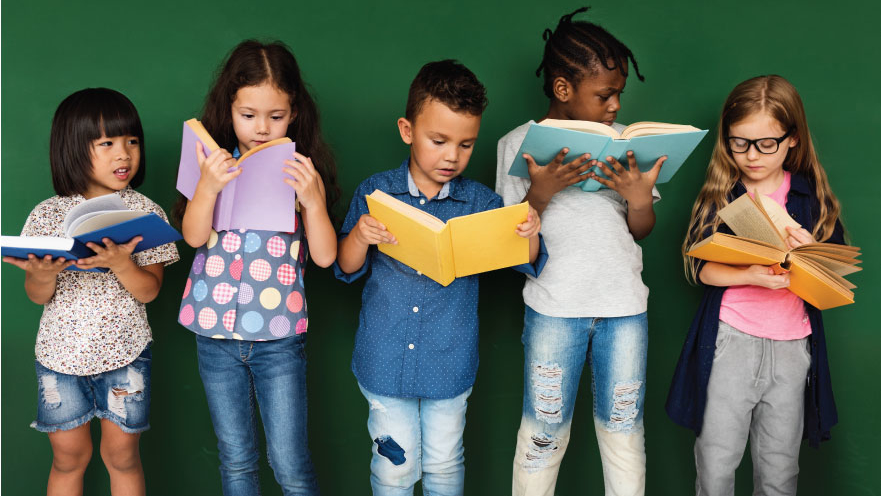
In this article, we will share how pre-school educators and parents can support the development of social-emotional skills in young children and practical ways to do so. Books are a great way to strengthen important social-emotional skills. Families and teachers should be in contact with each other while providing education on these two separate subjects (reading books and social-emotional skills).
In this article, we’ll talk about how educators and parents can reinforce and advance social-emotional skills in and out of the classroom. We will explain how parents and social-emotional skills training can be integrated together on common ground in child education. We will detail how literacy can play a critical role in educating children about emotions and how children can discover and manage their emotions.
What is Social-Emotional Learning?
When we say learning, we often think of cognitive skills, like learning to read or adding and subtracting. We were not born knowing how to do any of this. We were also not born knowing how we should be in a social setting or how we should manage our emotions.
So, when we think about the social side of social-emotional learning, what we essentially want is for children to develop a healthy identity and learn to relate, first with themselves and then with others. We want children to learn to interact, share, take turns and solve problems.
In the emotional part, we want children to learn about their feelings. They need to understand their own feelings and overcome difficulties. They must also recognize the feelings of others and communicate effectively about their own. It is important for children to be able to show their emotions correctly or empathize. Like learning to read or learning to multiply, becoming more socially and emotionally aware is the knowledge that will stay with us for a lifetime. When we learn how to get along with others, we can truly live healthier and more productive lives.
History of Social-Emotional Learning and Education
According to recent studies, teachers and families have started to gain more awareness about social-emotional learning, and studies on this subject have increased. Education was interrupted due to the COVID pandemic, and it can be said that this interruption makes social-emotional learning even more important. Educators and families started to need more education and training on this issue because the epidemic was actually a very stressful event even for small children. Educators and families should teach children how to deal with this stress and anxiety.
The Institution for Academic, Social, and Emotional Learning (CASEL) has a lot of great work on social-emotional learning. We must support children in learning these important and lifelong skills. There is also a lot of research showing that we seriously need this. Knowing how to get along with others, controlling their emotions, and being able to name their emotions are skills that children should learn early on. In addition, this does not mean that only social-emotional skills training should be given to children. On the contrary, academic skills and social-emotional skills should be taught in an integrated way because both are equally important in children’s development.
To give an example: if you are hungry, worried about your safety, it will be harder for you to detect other information. Social-emotional learning gives you an opportunity to help and support children with such needs. In this way, you can develop other kinds of skills that need to be taught by solving social-emotional problems.
Maslow’s Hierarchy is a key concept in this regard. We must not forget that we are, in fact, educating people. Children are little people, and we need to provide important basic needs before we move on to other parts of the Hierarchy.
How can we support children in social-emotional skills training?
First of all, it is important that we consider how adults learn and how children learn, in order to see the difference. Children can learn some skills indirectly, for example, by observing how you behave as a guest and trying to imitate you. Children see parents, families, or teachers as role models. They watch us as we experience or try to control our emotions.
Therefore, it is important that we know that we are modeling for children, even when they are watching or not. We need to allow children to think and to hear our thoughts as well. It is important that children see how we resolve conflicts or hear us think out loud about a problem. Such small movements will help develop their social-emotional skills.
While it’s great for children to learn by self-monitoring, we want to make sure teachers and families understand how social-emotional skills can be taught. Sometimes children need to be taught certain things explicitly. One of the first things to do to ensure that children truly learn these skills is not to expect them to learn on their own, but to take the time to deliberately teach them something.
How to Develop Social-Emotional Skills in Children Through Books?

One of the great tools that really work and always works when you need to teach something clearly is reading a book. Reading books will definitely open new worlds to children. They can learn how to behave in social situations, how to solve problems, and how to name emotions, thanks to the characters in the books they read.
We need to ask and reflect on thought-provoking questions about how the characters are feeling. It’s really important that we then let the kids draw, paint, and even stimulate those feelings about it. After that, questions can be asked to improve oral language skills. “So what did this character do in the end?” or “Have you ever felt this way? Has this ever happened to you?” It’s actually kind of like not just asking questions about the story, but really taking that story and making it realistic for them. We can develop social-emotional skills by asking what is going on in their own lives.
Therefore, books are a great way to strengthen important social-emotional skills and it is important that parents and teachers communicate throughout this training. “We’re working on this particular skill this week. Let your child join the conversation if the topic is discussed at home.” It is important that we take advantage of the opportunities that arise on social-emotional issues, not only at school but also at home.
Why is it important for children to learn about all emotions?

Some parents are concerned about their children’s feelings. That’s why they think it’s not helpful to talk about being angry or sad or to teach them about these feelings. We never want our children to be sad. We do not want our children to be angry at all. We would be delighted if everyone was always happy if there were always rainbows and butterflies, but there is no such thing.
If we give children an environment where they never have to experience these emotions, when they do, they suddenly don’t know how to handle them. First, we must teach children how to name their feelings. We can do this with books because there are very good children’s books on the market.
If the feeling of anger is handled in a book, it is necessary to take a break in class or at home and think about the questions. “Has anyone ever been angry before? What makes you angry and what do you do when you are angry? What is the right way to deal with this anger?” such questions can be asked. It is important to teach children that this is an actual feeling. This is because anger is also an actual feeling, and children will feel it eventually.
It is necessary to benefit from such stories to develop social-emotional skills. Many of these are stories you can read at home and at school. To get children to think about their feelings, moods, and behaviors, you should read these books over and over to them.
Parents and trainers who want to join the Pre-Education family or want to get detailed information about our services can reach us by filling out the application forms on our website.
